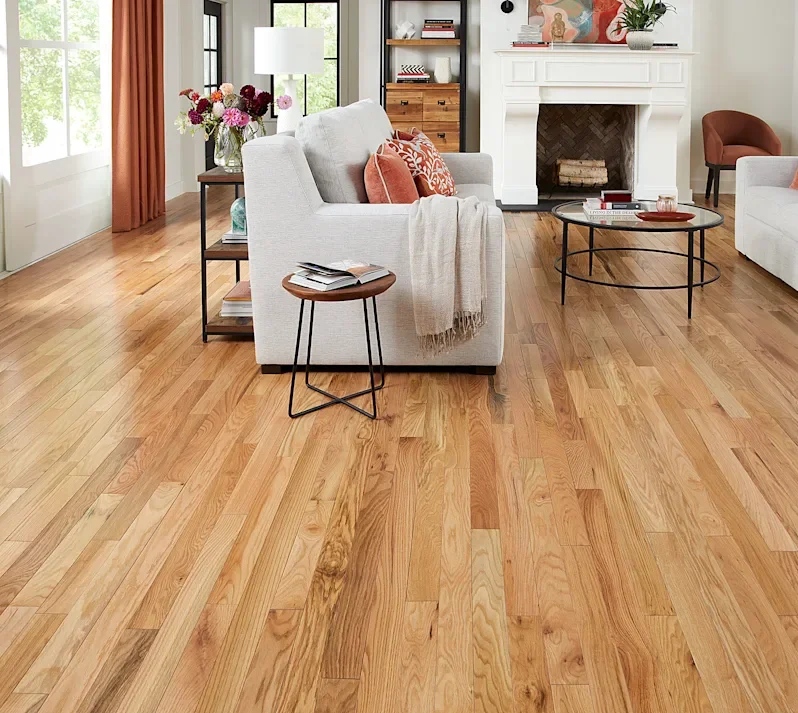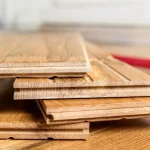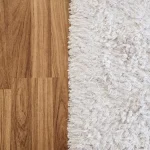- September 19, 2024
Engineered hardwood installation usually costs homeowners from $2,000 to $7,000.
Engineered hardwood flooring is a popular choice for both homeowners and designers. This popularity stems from its durability, aesthetic appeal, and versatility. Unlike solid hardwood, engineered hardwood is made of multiple wood layers. The top layer is a real hardwood veneer, which offers the same natural beauty. It is more resistant to moisture and temperature changes. This feature makes engineered hardwood ideal for areas where traditional hardwood might not work. These areas include basements or installations over concrete subfloors.
The costs of installing engineered hardwood floors can vary significantly. These costs depend on several factors – the type of engineered hardwood, the installation method, and the subfloor condition. By grasping these costs upfront, homeowners can budget more effectively. This understanding also helps them make informed decisions that align with their needs and financial plans.
Choosing engineered hardwood comes with several benefits. These include long-term durability and a wide range of style options. Engineered hardwood also has the potential to add significant value to your home. For a cost-effective hardwood look, engineered hardwood is a great choice.
Factors Influencing Installation Costs
Several factors significantly influence the installation costs of engineered hardwood floors.
Type and Quality of Engineered Hardwood
The thickness of the planks can influence the price. Thicker planks typically cost more. They use higher-quality materials and involve more intricate manufacturing processes. The wood species also affect cost. Exotic or rare species generally cost more. They have a higher price tag compared to more common varieties. Also, plank width can impact pricing. Wider planks are often more expensive. It is due to the increased material required and greater production complexity.
Room Size and Shape
The size and shape of the room where the flooring is to be installed also impact costs. Larger rooms or areas with complex layouts will generally incur higher installation costs. It includes spaces with many angles or curves. More material is needed to cover the space. The complexity of the room’s shape may also lead to increased labor time and waste.
Subfloor Condition
The condition of the subfloor is another critical factor. A well-prepared subfloor is essential for a smooth and durable installation. If the subfloor is uneven or damaged, it can add to the overall cost. Additional preparation work, such as leveling or moisture control, also increases the cost. Proper subfloor preparation ensures optimal performance of the engineered hardwood flooring. It also reduces the risk of future issues.
Installation Method
The installation method chosen also affects the cost. There are several methods for installing engineered hardwood: floating, glue-down, and nail-down.
- Floating installations are less expensive. In this method, planks are clicked together and rest on an underlayment without being attached to the subfloor.
- Glue-down installations involve adhering the planks directly to the subfloor with adhesive. This method can be more costly due to the price of materials and additional labor.
- Nail-down installations involve nailing the planks to a wooden subfloor. This method can be pricier, especially if the subfloor needs reinforcement.
Geographic Location
Geographic location plays a role in the cost of installation. Labor costs can vary widely depending on the region. Some areas have higher rates due to cost of living and demand for flooring professionals. As a result, installation costs can fluctuate significantly based on where you live.
Breakdown of Installation Costs
When analyzing the installation costs for engineered hardwood floors, break down the expenses. These include material costs, labor costs, and additional costs.
Material costs: Engineered hardwood typically ranges from $3 to $12 per square foot. The price depends on thickness, wood species, and plank width. Higher-quality materials or exotic wood species will be more expensive. They fall on the higher end of this spectrum. In addition to the plank cost, there are other materials to consider. Underlayment provides a cushioning layer and helps with sound absorption. It generally costs between $0.50 and $2 per square foot. Adhesives or nails are used in certain installation methods. They also contribute to the overall material cost.
Labor costs: On average, labor costs for installing engineered hardwood range from $3 to $8 per square foot. Several factors influence these costs. These include the complexity of the installation, regional labor rates, and the experience level of the flooring professionals. For instance, more complex room layouts with many angles or curves require additional time and skill. It can increase labor costs. Regional differences can also play a significant role. Areas with a higher cost of living or greater demand for skilled workers tend to have higher labor rates.
Additional costs: Removing old flooring is a common extra expense. The cost can vary based on the type and amount of flooring you remove. This process can cost anywhere from $1 to $4 per square foot. Leveling the subfloor is often necessary for a smooth installation. It can also add to the overall cost. Depending on the extent of the leveling required, this can range from $1 to $3 per square foot. Other potential extras might include moisture barriers. Specialized trim and molding can also contribute to the final expense.
Engineered Hardwood vs. Solid Hardwood
Cost is a significant factor when deciding between engineered hardwood and solid hardwood. Engineered hardwood is more affordable than solid hardwood. It is due to its construction. Engineered hardwood consists of a thin layer of hardwood veneer over a high-density fiberboard or plywood. It makes engineered hardwood a cost-effective choice. It achieves a hardwood look without the higher price tag.
Engineered hardwood is more stable and less prone to expansion and contraction with changes in humidity. It makes it suitable for areas where solid hardwood is not ideal. Examples include basements or over concrete slabs. Solid hardwood is generally more expensive. However, it offers a timeless appeal and can be sanded and refinished multiple times. It extends its lifespan. Choosing solid hardwood may be preferable for high-traffic areas. It is also a good choice for those seeking a more durable and long-lasting option.
Engineered Hardwood vs. Laminate Flooring
Engineered hardwood generally costs more than laminate flooring. It reflects its higher-quality materials and construction. Engineered hardwood features a genuine wood veneer over a core of plywood or fiberboard. It provides an authentic wood look and feel. In contrast, laminate flooring uses a photographic layer. This layer mimics the appearance of wood. Laminate flooring has a more budget-friendly price point.
Also Read: Laminate Flooring vs. Solid Hardwood | Full Comparison
Installation differences also impact the decision. Engineered hardwood often requires more precise installation techniques, such as glue-down or nail-down methods, which can be more complex and costly. Laminate flooring is designed for easier DIY installation. It features a click-lock system and can be installed as a floating floor over most existing surfaces.
Engineered Hardwood vs. Vinyl Plank Flooring
Engineered hardwood is more affordable than solid hardwood. However, it still tends to be pricier than vinyl plank flooring. Vinyl plank flooring is often more budget-friendly. It is due to its synthetic construction. Vinyl planks feature a photographic layer and a wear layer. These layers mimic the appearance of wood at a lower cost.
Also Read: Hardwood Flooring vs. Vinyl: Which One to Choose?
Vinyl plank flooring is known for its durability and resistance to moisture. It’s a practical choice for areas prone to spills and high humidity. Both options offer cost-effective solutions. Vinyl plank flooring provides an attractive, low-maintenance alternative to real wood.
DIY vs. Professional Installation
DIY installation can offer significant cost savings. By handling the installation yourself, you avoid labor costs. Labor costs can be a substantial portion of the total expense. Many engineered hardwood flooring products are designed for easier installation. They feature click-lock systems. This facilitates a straightforward process for homeowners with basic DIY skills.
However, DIY installation comes with potential risks and challenges. Achieving a flawless result requires precise measurements. It also needs proper subfloor preparation and meticulous installation techniques. Mistakes made during installation can lead to uneven floors or gaps. They might also cause damage to the flooring. Fixing these problems costs more than hiring a professional from the start.
On the other hand, professional installation offers several advantages. Experienced installers bring expertise and efficiency. They ensure that the job is done correctly and quickly. Professionals are skilled in handling complications. These may include subfloor issues or complex room layouts. They have access to specialized tools and techniques. They can enhance the final result. Professional installation is particularly recommended in certain situations. These include when the flooring needs to be installed over uneven subfloors, in complex layouts, or when high-quality finishes are desired.
Cost differences between DIY and professional installation can be substantial. DIY might save you money upfront. However, the potential for errors and additional repairs could negate those savings. Hiring a professional involves a higher initial cost. However, this often includes warranties and the assurance of a high-quality installation. Ultimately, the choice depends on your budget, confidence in your DIY skills, and the complexity of the installation job.
Long-Term Costs and Maintenance
Ongoing maintenance expenses for engineered hardwood are generally moderate. Regular cleaning with a dry mop is usually sufficient. A slightly damp mop can also be used. It is enough to keep the floors looking their best. Using recommended cleaning products helps avoid damage.
The costs for these products are relatively low compared to other flooring options. Occasional refinishing may be needed. It depends on the veneer thickness and the level of wear and tear. Refinishing is more involved and costly than routine cleaning. However, it can extend the lifespan of the flooring.
The longevity of engineered hardwood floors is another important factor in long-term costs. Engineered hardwood typically has a lifespan of 20 to 30 years. It depends on the quality of the product and the level of care it receives. This durability can make it a cost-effective choice over time. It avoids the need for frequent replacements.
Warranty considerations also play a significant role in the overall cost of ownership. Most engineered hardwood floors come with warranties. These warranties cover defects in materials or manufacturing. The specified period usually ranges from 10 to 25 years. A strong warranty can offer peace of mind. It can also reduce potential repair or replacement costs. It’s important to understand the terms of the warranty. It includes any requirements for proper maintenance. Understanding these terms ensures that you’re fully covered.
Overall, the initial cost of engineered hardwood may be higher than some alternatives. However, its reasonable maintenance costs, long lifespan, and robust warranties contribute to its value over time.
Cost-Saving Tips
To save on engineered hardwood floors, consider several cost-saving strategies.
- First, buying in bulk can significantly reduce costs. Purchasing larger quantities of flooring material often comes with discounts. It can also result in lower per-unit prices. This approach minimizes the cost of the flooring itself. It also reduces shipping expenses if suppliers offer bulk deals.
- Take advantage of seasonal discounts and promotions. Flooring retailers frequently offer sales during certain times of the year. These include end-of-season clearances or holiday promotions. Timing your purchase to align with these sales can lower your overall expenses.
- Choosing the right installation method is another effective way to save money. Opting for a more cost-effective installation method can reduce labor costs. For example, a floating floor with a click-lock system is a good choice. This type of installation is generally simpler and quicker than glue-down or nail-down methods. They require more time and expertise. Select a method that suits your DIY skills or simplifies professional installation. It can lead to significant savings without compromising quality.
- Preparing the room yourself can also contribute to cost savings. Taking on some preparation tasks can reduce the labor required by professionals. These tasks include removing old flooring, cleaning the subfloor, and moving furniture. You minimize the need for additional labor charges by handling these tasks yourself. It also helps streamline the installation process.
Conclusion
In summary, several factors influence the cost of installing engineered hardwood floors. These include material quality, room size, subfloor condition, and installation method. Bulk purchasing, seasonal discounts, and DIY preparation can help manage costs. When deciding, balance your budget with long-term goals and specific needs.
Engineered hardwood offers a cost-effective, durable flooring option. However, it’s crucial to consider all related expenses. Choose wisely to ensure it meets your requirements. It will help enhance your home’s value. Careful planning is essential. Informed decisions will help you achieve the best results. This approach will also keep you within budget.
Ready to get started on your new project? Visit our Flooring store in Sunnyvale and explore our wide range collection of flooring types. Also, our professionals at Elephant Floors would love to help you and guide you through the whole process. Or just call +1 408-222-5878.
F.A.Q. | Cost to Install Engineered Hardwood Floors
The average cost to install engineered hardwood ranges from $6 to $12 per square foot. It includes both the cost of the flooring and professional installation. Costs can vary based on factors like the quality of the material. They also depend on the installation method and regional labor rates.
Engineered hardwood can be installed in high-moisture areas. It includes basements or over concrete slabs. It is suitable due to its stability and resistance to humidity. Proper moisture barriers are essential. Subfloor preparation is also crucial. These measures help prevent warping or swelling. Always follow manufacturer guidelines for best results.
Complex layouts with many angles or curves require more precise cuts. They also need additional time. They increase labor costs. Irregular shapes may also result in more waste, raising material expenses. Simple, rectangular rooms incur lower installation costs.
Yes, engineered hardwood is a good investment for increasing home value. Its durability, stylish appearance, and easy maintenance appeal to buyers. It can offer a higher return on investment than other flooring options. It’s a smart choice for enhancing your home’s market value.
When budgeting for engineered hardwood, consider additional costs. These include subfloor preparation, underlayment, and adhesives. Nails may also be required. Don’t forget to include installation fees. Consider the potential removal of old flooring. Also, account for any necessary repairs.


